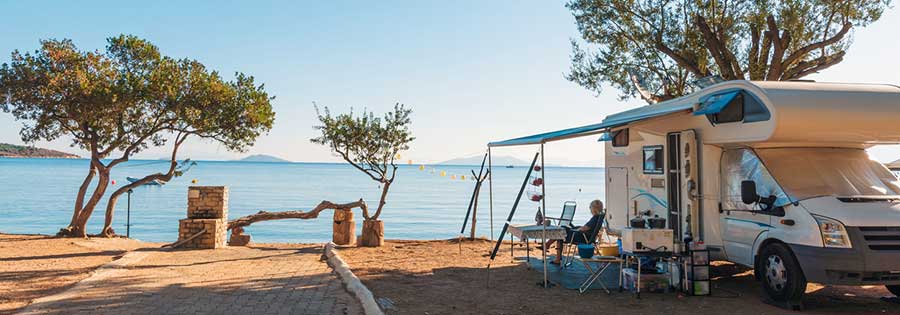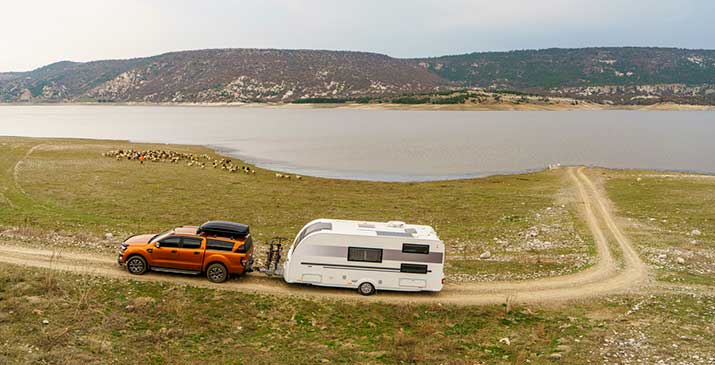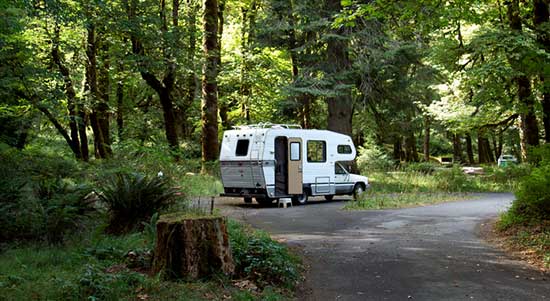Adventure is calling
Nothing beats the convenience and comfort of an RV when it comes to exploring the beautiful Pacific Northwest. Whether you’re looking at a new or used RV, Solarity's loan options are as flexible as your recreational needs. We make it easy to finance that motorhome, fifth wheel, toy hauler, camper or travel trailer you've had your eye on. We also offer RV loan refinancing options to help lower your interest rate or monthly payment.
Need a larger vehicle to tow your new RV? We've got you covered with Solarity CU auto loans, too!
Featured RV loan rate
New and used RVs, 2019 or newer, under 100,000 miles

Get a great deal on your RV loan
Purchase or refinance
Purchase through a dealer or let us help refinance your current loan, including cash-out options.
New or used
Whether it's new or "new to you," we have the loan options you need to get you camping faster.
Easy on the wallet
Competitive rates, generous terms and no loan setup or early pay-off fees
All types of RVs
We finance motor homes, campers, travel trailers, fifth wheels, toy haulers and more.
Light on paperwork. Big on service.
Buying an RV should be as easier than getting it backed into a campsite. That’s why we process your loan with as little paperwork as possible. Here are a few easy steps to help get you into your new (or new-to-you) RV.
- Step 1: Apply. Complete a loan application online, by phone, or at your favorite location. You can also apply for pre-approval for an RV loan before you shop.*
- Step 2: Value. For new RVs, we use up to 85% of dealer MSRP as its value. For used RVs, we’ll complete the value using the NADA (National Automobile Dealers Association).
- Step 3: Sign and drive. After you've been approved and found the perfect RV, sign on the dotted line at the dealership and hit the road.*
Shop with confidence
Apply for RV loan pre-approval before you shop for your new camper, motor home, fifth wheel, travel trailer or toy hauler. This can give you leverage when you are negotiating at the dealership. Plus, it can help you avoid snap financing decisions or feeling pressured to buy "add-ons." Getting pre-approved lets you know how much you can afford and anticipate what your monthly payment will be.
You can get pre-approved in advance of shopping or you can get pre-approved onsite with one of our partner dealerships.* Solarity works with auto dealerships in Washington through our Dealership Partner Program. Visit a participating dealership and ask for financing through Solarity Credit Union. With the same great rates and terms, it's easy to get financed and drive away—all in a single visit to the dealer. If you’ve been pre-approved with Solarity, simply let the dealer know and you'll be good to go.
Advantages of getting pre-approved
- Know your price range in advance to avoid overspending
- Understand your loan options--such as rate, term and payment--ahead of time
- Leverage your pre-approval to negotiate as a "cash" buyer
- Side-step financing games, tactics and last-minute "add-ons"
Our members say it best:

Hit the road with an RV loan from Solarity
You have options when it comes to financing your new RV. Work directly with the dealer or get pre-approved in advance. Either way, it's as easy as apply, sign and go!
Online
Applying online is simple and our experts are standing by if you have any questions.
Apply nowCall
Ready to talk to someone right now? We're ready to talk to you, too! Call 800.347.9222.
Make the callCome say hi
Stop by a branch to say hello and get to know your local financial experts.
Find a branchWhat is RV Financing?
Like many other big purchases, RV financing involves securing a loan from a financial institution such as a bank or credit union. The loan amount covers the cost of the RV, which the buyer repays over a predetermined period in monthly installments. Upon obtaining the funds, buyers agree to specific terms, including the interest rate, loan duration and monthly repayment amount. The primary objective of RV financing is to enable individuals to buy an RV without having to make the entire payment upfront. This makes RV ownership more accessible and manageable, spreading the cost over a period of time rather than taking on a substantial one-time expense.
Some financial institutions may provide zero-down financing options for RV purchases, allowing buyers to avoid making an initial down payment. While this may seem appealing, it's essential to be aware of the potential risks and drawbacks associated with this type of financing. Lenders offering zero-down financing might mitigate their risks by implementing higher interest rates or requiring elevated monthly payments. By doing so, they aim to protect themselves from potential losses in case the buyer defaults on the loan. Consequently, this can result in higher overall costs for the buyer over the loan term.
For the buyer, zero-down financing can be risky as well. Without an initial down payment, the buyer might find themselves immediately "upside down" on the loan, meaning they owe more on the RV than it is worth. This situation can make it difficult to sell or trade in the RV later on without incurring a loss. Additionally, if the buyer experiences financial difficulties or the RV depreciates rapidly, they might face challenges in keeping up with the higher monthly payments, leading to potential loan default or repossession of the RV.
In summary, while zero-down financing may seem attractive initially, it's crucial for both the lender and the buyer to carefully assess the terms, interest rates and potential risks associated with such financing options. In some cases, it may be more prudent to consider making a down payment to reduce the overall loan amount and associated financial risks.
Generally, RV down payments can range from 10% to 20% of the RV's purchase price. However, some lenders might require a higher down payment, especially for borrowers with less-than-perfect credit.
The size of the down payment has a direct impact on several key loan terms:
Interest rate – A larger down payment is seen as a sign of lower risk for the lender, and as a result, borrowers with substantial down payments are often rewarded with more favorable interest rates. Lower interest rates can lead to significant savings over the life of the loan.
Loan term – The amount of the down payment can also influence the length of the loan term. With a larger down payment, the total loan amount is reduced, which may enable borrowers to opt for shorter loan terms, potentially paying off the loan sooner.
Monthly payment – A substantial down payment decreases the loan amount, leading to lower monthly payments. This can make the loan more affordable and manageable for the borrower.
Loan-to-value ratio (LTV) – The down payment plays a critical role in determining the loan-to-value ratio, which is the percentage of the RV's purchase price that is financed by the loan. A higher down payment results in a lower LTV, which can be advantageous for securing better loan terms.
In summary, the down payment size significantly impacts the loan's overall terms and the borrower's financial situation throughout the loan period. It is essential for prospective buyers to explore various lenders' requirements and carefully consider how different down payment amounts will affect their loan terms and overall financial commitment.
The monthly payment on an RV can vary widely based on several factors, including the total loan amount, interest rate, loan term and any down payment made.
To calculate the monthly payment, you can use a standard loan payment formula: Monthly Payment = (Loan Amount * Monthly Interest Rate) / (1 - (1 + Monthly Interest Rate) ^ -Loan Term in Months).
Don't worry, we have you covered with our online RV loan calculator.
It's important for borrowers to research different lenders, compare loan offers and understand the specific terms and conditions before committing to any loan for an RV or camper.
The entire process, from application submission to loan approval, can take anywhere from a few days to a few weeks, depending on the lender's efficiency and the complexity of your financial situation.
At Solarity, applying online for an RV loan doesn’t take more than a few minutes, and we process your loan with as little paperwork as possible.

What is a typical RV loan interest rate?
Interest rates are subject to change over time and can fluctuate based on various economic factors and market conditions. For the most current information on RV loan interest rates, it's best to check with multiple lenders and financial institutions to compare their offers and find the most competitive rate that suits your specific financial situation. The typical RV loan interest rates can vary widely depending on factors such as the borrower's credit score, the loan term, the lender, and the prevailing economic conditions.
To get the best possible interest rate on an RV loan, it's essential to shop around, compare offers from multiple lenders and consider factors like loan term, down payment and your overall financial situation. If you're concerned about high interest rates, improving your credit score and making a larger down payment may help secure a more competitive rate.
1. Improve your credit score
2. Compare different lenders to find the most competitive rate
3. Make a larger down payment
4. Choose a shorter-term loan
5. Refinance to a lower interest rate
6. Consider making additional payments toward the principal
7. Ensure your loan does not have prepayment penalties
What is the average credit score needed for RV financing?
To purchase an RV or camper, it is advisable to have a credit score ranging from 650 to 700 or higher, as it demonstrates strong creditworthiness and increases your chances of easily qualifying for an RV loan. In cases where your credit score falls below 650, you might be able to still obtain an RV loan with some lenders, but be aware that loans with bad credit may come with higher interest rates, making them more expensive.
In the United States, under certain circumstances, RV loan interest may be tax-deductible if the RV is considered a qualified second home. To be eligible for the tax deduction, the RV must meet the following requirements:
1. It must be used as security for the loan, meaning it serves as collateral for the loan.
2. It must have sleeping, cooking and toilet facilities, making it suitable for use as a dwelling.
Consult your tax advisor for more details.

Can you pay off an RV loan early?
One of the main benefits that come with a simple interest loan is that there are no penalties for prepayments. You will have monthly payments that cover the interest accrued and then a portion of the principal. If you want to pay it off early, you will only have to pay interest for the time period you had the loan out.
Can you pay off an RV loan faster to avoid interest?
Yes, you can pay off an RV loan faster to reduce the amount of interest you'll pay over the loan term. Paying off your RV loan ahead of schedule can save you money on interest and potentially shorten the overall loan term. However, always check with your lender to ensure there are no additional fees or penalties associated with early repayment. Additionally, consider your overall financial goals and budget to determine if paying off the loan faster aligns with your financial priorities.
What's the difference between RVs and campers?
RV (recreational vehicle): An RV is a broad term used to describe any motorized or towable vehicle that combines transportation and temporary living accommodation. It includes various types, such as motorhomes, campervans, travel trailers, fifth wheels and more. RVs typically have amenities like beds, a kitchen, a bathroom and living spaces. They are designed for recreational travel and can be used for camping, road trips and other leisure activities.
Camper: A camper, on the other hand, is a more specific term that generally refers to a towable RV. It is a trailer or a camper shell designed to be towed behind a vehicle, such as a truck or an SUV. Campers come in various sizes and styles, ranging from compact pop-up campers to larger, more luxurious models. They offer the convenience of a home on wheels, with sleeping quarters, a kitchenette and sometimes a small bathroom. Campers are often disconnected from the towing vehicle once parked at a campsite or destination.
Protect your new RV or camper with Guaranteed Asset Protection (GAP) insurance.

The ease of getting approved for an RV loan depends on several factors, including your credit score, income, debt-to-income ratio, down payment and the lender's specific requirements and policies. Generally, if you have a good credit score (typically 650 and above), a stable income and a reasonable debt-to-income ratio, you are more likely to be approved for an RV loan. Having a higher credit score can make the approval process smoother and may qualify you for more favorable loan terms, such as lower interest rates. On the other hand, if you have a lower credit score or less stable financial circumstances, getting approved for an RV loan can be more challenging, and you might be offered less favorable terms, such as higher interest rates or a larger down payment.
It's essential to shop around and compare offers from different lenders to find the best RV loan option for your financial situation. Some lenders specialize in RV loans and may be more flexible in their approval criteria for borrowers with lower credit scores or unique financial circumstances.
Make sure your RV has proper space and amenities for your specific needs.
Get an inspection. Have in-house mechanics check for mechanical issues, water damage, signs of excessive wear and tear and malfunctioning systems. While this inspection might require a small upfront fee, it could potentially save you significant expenses from unexpected problems in the future.
Make sure you research the RV year, condition, features and price range.
Ensure that your vehicle's towing capacity significantly exceeds the weight of the RV trailer. By doing so, you will not only reduce strain on your transmission but also prioritize safety by using a tow vehicle that is appropriately rated to handle the camper's weight.
Keep in mind that RV insurance solely covers the camper itself, excluding the contents inside. It's essential to have a discussion with your insurance agent to determine the most suitable policy for your requirements and contact your roadside assistance provider to include RV coverage in your plan.
It's also advisable to consider all costs associated with RV or camper ownership, such as insurance, maintenance and campground fees, in the overall budgeting process.
Other common questions about RV loans
- Fixed Interest Rates: RV loans typically have fixed interest rates, meaning your payments remain the same throughout the loan term, regardless of whether it spans a few years or a couple of decades.
- Down Payment: RV loans require a down payment, typically ranging from 10% to 20% of the total loan amount. This upfront payment reduces the loan principal.
- RV Inspections: Certain lenders may require RV inspections, which can cost between $200 and $1,200. These inspections assess the condition and value of the RV.
More information on RV loans

How soon can you refinance an RV loan?
Refinancing a loan at the right time can save you money. This is especially true if your financial situation has changed since you originally took out the loan.

10 most popular RV parks in Washington State
Interested in exploring the natural beauty of the Pacific Northwest? Pack up the RV and head out to some of the best RV parks Washington State has to offer!

How do RV loans work?
Looking to purchase an RV but not sure how to finance it? An RV loan may be the solution you need.
Loans to help you live life to the fullest

Auto Loans
From cars and trucks to SUVs and classic cars, we have loans for whatever drives you.
Explore auto loans
Boats and Motor Sports
Loans for just about anything that moves: trailers, snowmobiles, boats, ATVs and more
Let's go
Home Equity
Tap into the buying power of your home to pay for large expenses or consolidate debt.
Find out moreAnnual Percentage Rate (APR) accurate as of date shown and subject to change. All loans are subject to credit approval. Not all applicants will qualify for a loan or the lowest rate shown. Special terms and conditions may apply.

